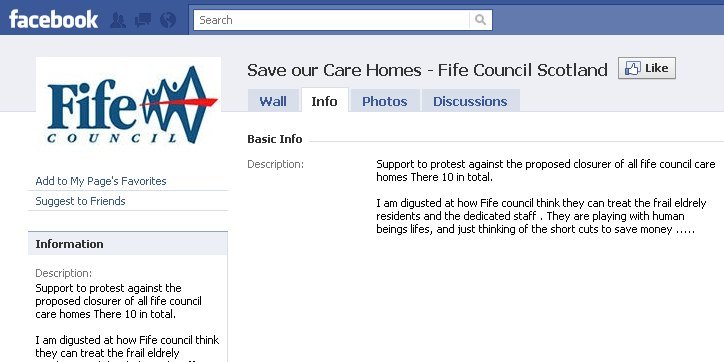Formal discussions with unions over the possibility of care staff taking pay cuts to retain residential care homes within council ownership have been given the go-ahead by councillors.
The move comes after some employees said they were willing to accept a reduction in some aspects of their terms and conditions of employment to save council-owned homes as part of the recent consultation into the future of residential care.
Staff costs for the council’s 10 care homes and the nearly 400 employees who work there stand at around £10.4 million a year, although the consultation highlighted a number of workers who felt they could alter their pay and conditions to allow the service to continue on its current footing.
Care home staff are single-status employees, with some of their terms and conditions negotiated nationally, such as sick pay, and others negotiated locally, such as out-of-hours payments.
With that in mind, head of human resources Sandy Gallanders said on Thursday that “informal” discussions with the unions had taken place on the matter but early indications were that changes to terms and conditions would prove to be a “step too far” for them.
Despite that, members of Fife Council’s policy, finance and asset management committee agreed that council chiefs and union leaders should nevertheless hold talks in the near future to see if there is any possibility of the notion being taken forward.”Extremely reluctant”Although pointing out he was “extremely reluctant” to pursue the matter much further, council leader Peter Grant said the only area he could see for possible movement was in out-of-hours payments for weekend working, night work and shift work.
However, he stressed that could mean £3000 a year taken out of people’s salaries.
Independent councillor Bryan Poole said it might be worth going back to the staff group who expressed an interest to see if they were open to any changes.
A report to councillors said changing terms and conditions could create a two-tier workforce in social work and be “controversial and potentially unlawful” in terms of equal pay legislation bearing in mind the staff group is predominantly female.
The report noted contractual difficulties in departing from national sick pay agreements, while changing locally agreed conditions for staff in the affected group could lead to “employee relations consequences.”
However, £1.3 million could effectively be saved by any changes in that respect.
The report added that changing conditions for one employee grouping in the wider single-status group would create the potential for a legal challenge.
While any changes seem highly unlikely, Mr Grant stressed that any conversations about the issue should be done through the proper channels and through the unions, highlighting the council’s commitment to collective bargaining and the local and national agreements already reached.
Labour councillor Kay Morrison said she was pleased the council was not doing anything to undermine those agreements or negotiations but was keen to shift the focus on to staff.
“We should be acknowledging what these members of staff have done,” she said. “We don’t know how many staff have done it but it shows a huge commitment to their roles, the way they do their job and the importance of their job to their clients.”
